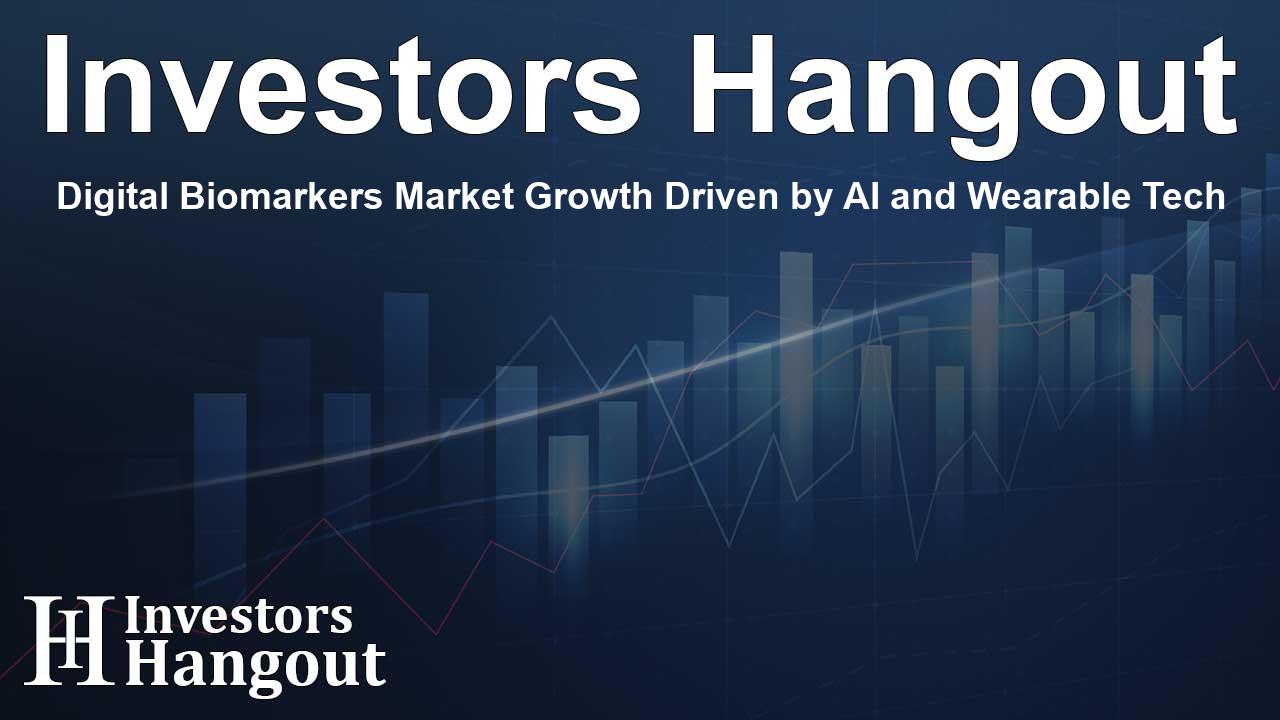Digital Biomarkers Market Growth Driven by AI and Wearable Tech

Digital Biomarkers Market Size & Growth Analysis
The global digital biomarkers market is on the trajectory of significant expansion, expected to grow from USD 5.84 billion to an impressive USD 24.88 billion by 2033. This growth represents a compound annual growth rate (CAGR) of 19.89% from 2026 to 2033. In particular, the U.S. market is also predicted to increase substantially, moving from USD 1.89 billion to USD 7.86 billion, with a CAGR of 19.49%. These figures illustrate a keen interest in leveraging new technologies for improving healthcare delivery.
Rising Demand Due to Chronic Diseases
The increasing prevalence of chronic diseases —such as cardiovascular issues, diabetes, and neurological disorders— significantly propels the demand for digital biomarkers. These innovations provide crucial insights between clinical visits, effectively sealing gaps in traditional patient care. As industries adopt artificial intelligence (AI), machine learning, and cloud-based infrastructure, the development and adoption of digital biomarkers are set for advances that were previously unimaginable.
Regulatory Support and Investment in Digital Health
Regulatory bodies like the FDA and EMA are establishing structured frameworks to facilitate the validation of digital biomarkers within clinical trials. Such moves create a favorable environment, encouraging pharmaceuticals and medtech companies to invest in digital endpoints. This is especially vital as these entities aim to speed up drug development timelines while fostering patient-centric care models.
Key Players in the Digital Biomarkers Market
Several major companies are at the forefront of the digital biomarkers market. Significant players include Apple Inc., Alphabet Inc. (Google Fit, Verily), Microsoft Corporation, Samsung Electronics Co., Ltd., and Fitbit (now part of Google). Others like Garmin Ltd., Medtronic plc, and Abbott Laboratories contribute substantially to market advancements. Additionally, Koninklijke Philips N.V., ResMed Inc., and AliveCor, Inc. are shaping the competitive landscape. Notably, Oura Health Ltd. and Withings SA emphasize the importance of consumer health monitoring through innovative products.
Segment Insights in the Digital Biomarkers Market
Cloud-based deployment solutions are leading the market with 46.11% market share in 2025. Retailers find these scalable and economical, making the switch to real-time analytics platforms more attractive. Hybrid solutions are forecasted to grow rapidly at a CAGR of 20.75%, appealing to businesses that need the flexibility of cloud computing with the security of on-premise data storage.
Biomarker Types Dominating the Market
Physiological biomarkers, crucial for monitoring vital signs like heart rate and blood glucose levels, captured 38.45% of the market share in 2025. Cognitive biomarkers, however, show the highest growth potential, expected to expand at a CAGR of 21.67%. The integration of AI in this sector is enhancing diagnostic capabilities and evaluating mental health conditions.
Applications Impacting the Growth of Digital Biomarkers
Digital biomarkers are making notable contributions particularly in neurology, representing 32.28% of the market. Innovations like IoT-enabled systems for the continuous monitoring of diseases such as Alzheimer’s and Parkinson's are setting new standards in patient care. In oncology, IoT helps in tracking therapy compliance and managing personalized treatment efficiently, projected to grow at a CAGR of 20.34%.
Platforms and End-Users Driving Adoption
Wearable devices dominate with 41.52% of the market share in 2025, attributed to the quick adoption of smarter watch technology and connected health devices. Mobile applications are anticipated to see the fastest growth rate at 22.89%, largely due to the rising smartphone usage coupled with AI-powered insights that help personalize healthcare experiences.
Regional Insights and Market Dynamics
North America holds the largest share of the digital biomarkers market due to robust healthcare technology partnerships and infrastructure. Meanwhile, the Asia Pacific region is on track for dramatic growth, with a CAGR of 21.07%. The swift adoption of digital healthcare initiatives and governmental support toward preventive health strategies are major factors in this upward trend.
Frequently Asked Questions
What is the expected growth rate of the digital biomarkers market?
The market is projected to grow at a CAGR of 19.89% from 2026 to 2033.
Who are the major players in the digital biomarkers market?
Key players include Apple Inc., Microsoft Corporation, and Alphabet Inc. (Google).
Why are digital biomarkers gaining popularity?
They provide actionable insights that bridge gaps in patient monitoring and care, especially for chronic diseases.
What technological advancements are influencing this market?
Artificial intelligence, machine learning, and cloud solutions are driving development and deployment in the digital biomarkers market.
How is the market segmented?
The market is segmented by biomarker types, applications, deployment modes, platforms, and end-users, among others.
About The Author
Contact Dylan Bailey privately here. Or send an email with ATTN: Dylan Bailey as the subject to contact@investorshangout.com.
About Investors Hangout
Investors Hangout is a leading online stock forum for financial discussion and learning, offering a wide range of free tools and resources. It draws in traders of all levels, who exchange market knowledge, investigate trading tactics, and keep an eye on industry developments in real time. Featuring financial articles, stock message boards, quotes, charts, company profiles, and live news updates. Through cooperative learning and a wealth of informational resources, it helps users from novices creating their first portfolios to experts honing their techniques. Join Investors Hangout today: https://investorshangout.com/
The content of this article is based on factual, publicly available information and does not represent legal, financial, or investment advice. Investors Hangout does not offer financial advice, and the author is not a licensed financial advisor. Consult a qualified advisor before making any financial or investment decisions based on this article. This article should not be considered advice to purchase, sell, or hold any securities or other investments. If any of the material provided here is inaccurate, please contact us for corrections.
